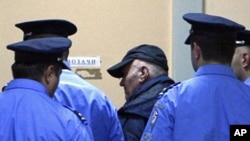Former Bosnian-Serb military leader Ratko Mladic has been arrested on charges of genocide, crimes against humanity and war crimes for his role in the Srebrenica massacre and the siege of Sarajevo during the Bosnian civil war in the early 1990s.
Ratko Mladic was one of Europe’s most wanted war crimes fugitives. He has been on the run for more than 15 years, since he was indicted by the United Nations war crimes tribunal at The Hague in 1995.
Now the long wait for his arrest is over.
Arrest details
Serbia’s President Boris Tadic would not say how or where Mladic was arrested. But he did say the capture had taken place on Serbian soil. He said a stain had been removed from Serbia.
“Today we closed one chapter of our recent history that will bring us one step closer to full reconciliation in the region,” Tadic said.
Mladic is a former Bosnian-Serb general. During the Bosnian war in the early 1990s he oversaw the siege of Bosnia’s capital, Sarajevo, which lasted more than three years and is the longest in the history of modern warfare.
|
Listen to analysis by Refik Hodzic, the director of communications for the International Center for Transnational Justice
|
He’s also accused of having played a key role in the bloody attack in 1995 of Srebrenica, where thousands of Muslim men and boys were killed in Europe’s worst massacre of civilians since the Second World War.
War crimes
Mladic is the last of three top Serbian leaders wanted for war crimes. At The Hague, where Mladic is due to be extradited, he will join Bosnian-Serb wartime leader Radovan Karadzic, who was captured in 2008. Former Serbian president Slobodan Milosevic died in custody before his trial ended.
But Amnesty International justice expert Marek Marczynsky says the trial of Mladic may finally bring some closure.
“The victims of those terrible crimes have tried to access justice, truth, and reparation, and Ratko Mladic is a symbol of those crimes,” Marczynksy said. "He is of course not the only one. There are thousands of perpetrators still waiting to be prosecuted.”
Life in hiding
The capture of Mladic has taken a long time because, Marczynksy says, he was protected by some of those who still hold power in Serbia. It was because of international pressure, he says, that the arrest was finally made.
“When the European Union started pushing for those arrests, for investigations and for prosecutions, finally after some time we could see some results,” Marczynksy said.
Mladic’s arrest was welcomed by international leaders. NATO Secretary-General Anders Fogh Rasmussen said Mladic had played a “key role” in some of the “darkest episodes of Balkan and European history”.
Mladic’s arrest was a precondition of Serbia joining the European Union. Now with him heading to The Hague, the country may be one step closer to that aim.




